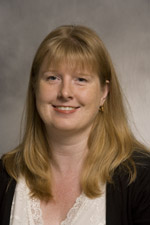 |
| "I don't think that we've really demonstrated that we can teach the fundamental ideas at any level. It'd sure be nice to do that!" |
Cliff the Researcher
Cliff started out the day, however, wearing his researcher hat. Students in Joan Garfield's statistics education research seminar asked him about his evolution as a researcher, accompanied by a dotplot ("headplot"?) of all his first-author papers, as reported by his publications page at UMass: |
| Over the years, Cliff has used his head extensively for research purposes |
Cliff's research has ranged from close studies of how people perceive randomness to informal inference and data analysis. He said his most proud accomplishment as a researcher is his 2002 Journal for Research in Mathematics Education article with fellow UMass researcher Alexander Pollatsek, "Data analysis as the search for signals in noisy processes", which explores why students are not comprehending the usefulness of measures of center. They argue that ideas of stochastic processes, rather than samples and populations, should be more emphasized in statistics instruction.
 |
| Cliff's papers getting all mixed up in TinkerPlots™. |
Cliff the Software Designer
For the afternoon, Cliff put on his software designer hat to show us his latest project with KCP Technologies, Inc., Data Games, a series of activities where students have to successfully analyze game data to improve their strategy. He's a co-PI on this project with Bill Finzer (see the full team here).But his researcher hat was still on, poking out from below the software designer hat! Cliff discussed how we typically introduce students to univariate data by discussing natural objects or events such as people's heights. He argues, however, that this is actually a very difficult context to think about measures of center and variability, because there is no concrete thing that the "average person's height" represents.
Instead, he proposes that we can more easily teach these concepts using repeated measures settings. He designed an activity where different students measure the teacher's head; in this case, the center of the distribution is the actual person's head, and the variability is the student's errors in measurement (rounding issues, where exactly they hold the measuring tape, and so on).
 |
| Cliff uses not only his own head, but Professor Joan Garfield's as well. |
But how can these be efficiently brought into the classroom? Having students do a production process or repeated measures takes quite a lot of time to collect the data. This is where the Data Games project comes in.
 |
| Ship Odyssey teaches students how to use rats for statistical inference. |
We had a great time seeing Cliff and hearing about his research, and we can't wait to see how Data Games develops. In the meantime, our challenge is to not let playing Ship Odyssey distract us from our end of semester work!




























